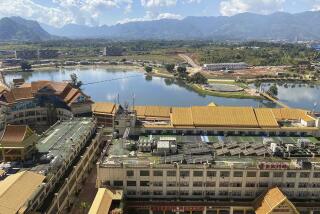Al Qaeda group said to take over major Yemeni city
- Share via
Reporting from Sana, Yemen — Yemen’s beleaguered government claimed Sunday that the capital of Abyan province in the south had been overrun by the country’s Al Qaeda affiliate, while the political opposition and dissident generals blamed the president for losing control of the city.
The allegations about Zinjibar, Abyan’s capital, raised fears that the radical group Al Qaeda in the Arabian Peninsula was taking advantage of the last four months of popular protests against President Ali Abdullah Saleh to gain ground.
A spokesman for Saleh’s ruling General People’s Congress party said Al Qaeda gunmen had seized Zinjibar’s government buildings Saturday after a shootout with Yemeni troops.
Yemen’s opposition military council, comprising commanders who have broken with Saleh after the wave of demonstrations began in late January, blamed the president for “handing over certain governorates to rogue elements.”
One Saleh critic, Gen. Abdullah Ali Elaiwah, a former defense minister, called for army units to join in the struggle to oust the president. “We call on you not to follow orders to confront other army units or the people,” he said in a statement from the rebel generals.
Troops loyal to the president have withdrawn from swaths of the country in recent months to concentrate on holding Sana, the capital. Last week, the elite Republican Guard, headed by Saleh’s son Ahmed, battled supporters of powerful tribal leaders in Sana and surrendered a base just outside the city on Friday before airstrikes were called in.
A truce was brokered over the weekend that stopped the fighting in Sana.
It was impossible to know for sure whether the armed men in Zinjibar was in Al Qaeda’s fold. Myriad separatist groups exist in the south, including rival militant organizations such as the Aden-Abyan Islamic Army, as well as clans resentful of Sana. The country experienced a civil war between north and south in 1994.
Some opposition leaders even accused the president of deliberately sending out Islamist gunmen to Zinjibar as part of a ruse to help Saleh stay in power.
In the years after the Sept. 11 attacks, the Yemeni leader capitalized on Washington’s fear that without him his country could fall into Islamic militants’ hands. But as the current demonstrations against his rule gained momentum, the United States eventually threw its weight behind proposals for Saleh to step down.
Craig is a special correspondent. Times staff writer Ned Parker in Baghdad contributed to this report.
More to Read
Sign up for Essential California
The most important California stories and recommendations in your inbox every morning.
You may occasionally receive promotional content from the Los Angeles Times.










